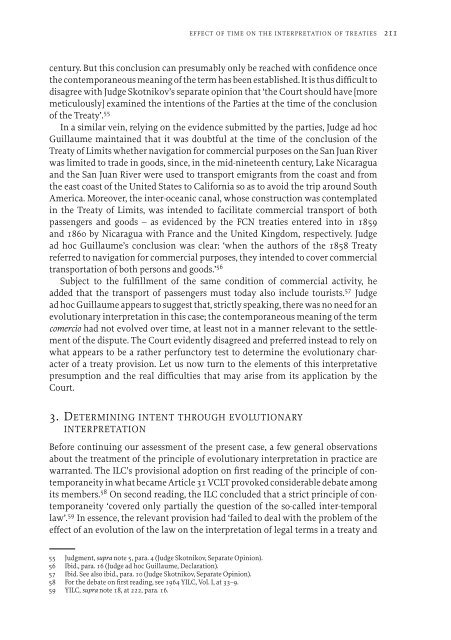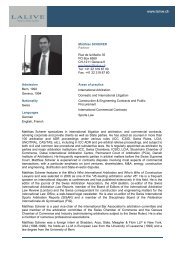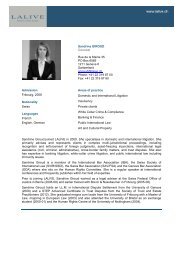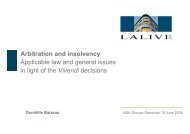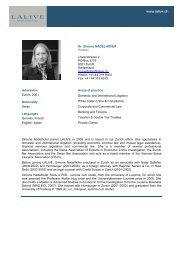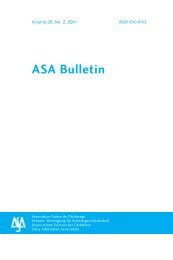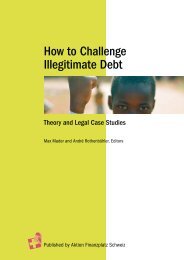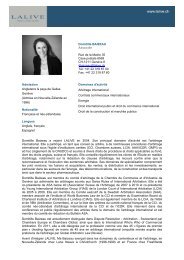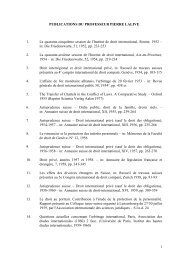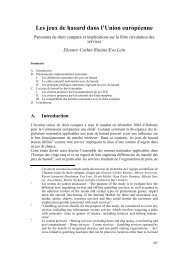The Effect of the Passage of Time on the Interpretation of Treaties ...
The Effect of the Passage of Time on the Interpretation of Treaties ...
The Effect of the Passage of Time on the Interpretation of Treaties ...
Create successful ePaper yourself
Turn your PDF publications into a flip-book with our unique Google optimized e-Paper software.
EFFECT OF TIME ON THE INTERPRETATION OF TREATIES 211<br />
century. But this c<strong>on</strong>clusi<strong>on</strong> can presumably <strong>on</strong>ly be reached with c<strong>on</strong>fidence <strong>on</strong>ce<br />
<str<strong>on</strong>g>the</str<strong>on</strong>g> c<strong>on</strong>temporaneous meaning <str<strong>on</strong>g>of</str<strong>on</strong>g> <str<strong>on</strong>g>the</str<strong>on</strong>g> term has been established. It is thus difficult to<br />
disagree with Judge Skotnikov’s separate opini<strong>on</strong> that ‘<str<strong>on</strong>g>the</str<strong>on</strong>g> Court should have [more<br />
meticulously] examined <str<strong>on</strong>g>the</str<strong>on</strong>g> intenti<strong>on</strong>s <str<strong>on</strong>g>of</str<strong>on</strong>g> <str<strong>on</strong>g>the</str<strong>on</strong>g> Parties at <str<strong>on</strong>g>the</str<strong>on</strong>g> time <str<strong>on</strong>g>of</str<strong>on</strong>g> <str<strong>on</strong>g>the</str<strong>on</strong>g> c<strong>on</strong>clusi<strong>on</strong><br />
<str<strong>on</strong>g>of</str<strong>on</strong>g> <str<strong>on</strong>g>the</str<strong>on</strong>g> Treaty’. 55<br />
In a similar vein, relying <strong>on</strong> <str<strong>on</strong>g>the</str<strong>on</strong>g> evidence submitted by <str<strong>on</strong>g>the</str<strong>on</strong>g> parties, Judge ad hoc<br />
Guillaume maintained that it was doubtful at <str<strong>on</strong>g>the</str<strong>on</strong>g> time <str<strong>on</strong>g>of</str<strong>on</strong>g> <str<strong>on</strong>g>the</str<strong>on</strong>g> c<strong>on</strong>clusi<strong>on</strong> <str<strong>on</strong>g>of</str<strong>on</strong>g> <str<strong>on</strong>g>the</str<strong>on</strong>g><br />
Treaty <str<strong>on</strong>g>of</str<strong>on</strong>g> Limits whe<str<strong>on</strong>g>the</str<strong>on</strong>g>r navigati<strong>on</strong> for commercial purposes <strong>on</strong> <str<strong>on</strong>g>the</str<strong>on</strong>g> San Juan River<br />
was limited to trade in goods, since, in <str<strong>on</strong>g>the</str<strong>on</strong>g> mid-nineteenth century, Lake Nicaragua<br />
and <str<strong>on</strong>g>the</str<strong>on</strong>g> San Juan River were used to transport emigrants from <str<strong>on</strong>g>the</str<strong>on</strong>g> coast and from<br />
<str<strong>on</strong>g>the</str<strong>on</strong>g> east coast <str<strong>on</strong>g>of</str<strong>on</strong>g> <str<strong>on</strong>g>the</str<strong>on</strong>g> United States to California so as to avoid <str<strong>on</strong>g>the</str<strong>on</strong>g> trip around South<br />
America. Moreover, <str<strong>on</strong>g>the</str<strong>on</strong>g> inter-oceanic canal, whose c<strong>on</strong>structi<strong>on</strong> was c<strong>on</strong>templated<br />
in <str<strong>on</strong>g>the</str<strong>on</strong>g> Treaty <str<strong>on</strong>g>of</str<strong>on</strong>g> Limits, was intended to facilitate commercial transport <str<strong>on</strong>g>of</str<strong>on</strong>g> both<br />
passengers and goods – as evidenced by <str<strong>on</strong>g>the</str<strong>on</strong>g> FCN treaties entered into in 1859<br />
and 1860 by Nicaragua with France and <str<strong>on</strong>g>the</str<strong>on</strong>g> United Kingdom, respectively. Judge<br />
ad hoc Guillaume’s c<strong>on</strong>clusi<strong>on</strong> was clear: ‘when <str<strong>on</strong>g>the</str<strong>on</strong>g> authors <str<strong>on</strong>g>of</str<strong>on</strong>g> <str<strong>on</strong>g>the</str<strong>on</strong>g> 1858 Treaty<br />
referred to navigati<strong>on</strong> for commercial purposes, <str<strong>on</strong>g>the</str<strong>on</strong>g>y intended to cover commercial<br />
transportati<strong>on</strong> <str<strong>on</strong>g>of</str<strong>on</strong>g> both pers<strong>on</strong>s and goods.’ 56<br />
Subject to <str<strong>on</strong>g>the</str<strong>on</strong>g> fulfillment <str<strong>on</strong>g>of</str<strong>on</strong>g> <str<strong>on</strong>g>the</str<strong>on</strong>g> same c<strong>on</strong>diti<strong>on</strong> <str<strong>on</strong>g>of</str<strong>on</strong>g> commercial activity, he<br />
added that <str<strong>on</strong>g>the</str<strong>on</strong>g> transport <str<strong>on</strong>g>of</str<strong>on</strong>g> passengers must today also include tourists. 57 Judge<br />
ad hoc Guillaume appears to suggest that, strictly speaking, <str<strong>on</strong>g>the</str<strong>on</strong>g>re was no need for an<br />
evoluti<strong>on</strong>ary interpretati<strong>on</strong> in this case; <str<strong>on</strong>g>the</str<strong>on</strong>g> c<strong>on</strong>temporaneous meaning <str<strong>on</strong>g>of</str<strong>on</strong>g> <str<strong>on</strong>g>the</str<strong>on</strong>g> term<br />
comercio had not evolved over time, at least not in a manner relevant to <str<strong>on</strong>g>the</str<strong>on</strong>g> settlement<br />
<str<strong>on</strong>g>of</str<strong>on</strong>g> <str<strong>on</strong>g>the</str<strong>on</strong>g> dispute. <str<strong>on</strong>g>The</str<strong>on</strong>g> Court evidently disagreed and preferred instead to rely <strong>on</strong><br />
what appears to be a ra<str<strong>on</strong>g>the</str<strong>on</strong>g>r perfunctory test to determine <str<strong>on</strong>g>the</str<strong>on</strong>g> evoluti<strong>on</strong>ary character<br />
<str<strong>on</strong>g>of</str<strong>on</strong>g> a treaty provisi<strong>on</strong>. Let us now turn to <str<strong>on</strong>g>the</str<strong>on</strong>g> elements <str<strong>on</strong>g>of</str<strong>on</strong>g> this interpretative<br />
presumpti<strong>on</strong> and <str<strong>on</strong>g>the</str<strong>on</strong>g> real difficulties that may arise from its applicati<strong>on</strong> by <str<strong>on</strong>g>the</str<strong>on</strong>g><br />
Court.<br />
3. DETERMINING INTENT THROUGH EVOLUTIONARY<br />
INTERPRETATION<br />
Before c<strong>on</strong>tinuing our assessment <str<strong>on</strong>g>of</str<strong>on</strong>g> <str<strong>on</strong>g>the</str<strong>on</strong>g> present case, a few general observati<strong>on</strong>s<br />
about <str<strong>on</strong>g>the</str<strong>on</strong>g> treatment <str<strong>on</strong>g>of</str<strong>on</strong>g> <str<strong>on</strong>g>the</str<strong>on</strong>g> principle <str<strong>on</strong>g>of</str<strong>on</strong>g> evoluti<strong>on</strong>ary interpretati<strong>on</strong> in practice are<br />
warranted. <str<strong>on</strong>g>The</str<strong>on</strong>g> ILC’s provisi<strong>on</strong>al adopti<strong>on</strong> <strong>on</strong> first reading <str<strong>on</strong>g>of</str<strong>on</strong>g> <str<strong>on</strong>g>the</str<strong>on</strong>g> principle <str<strong>on</strong>g>of</str<strong>on</strong>g> c<strong>on</strong>temporaneity<br />
in what became Article 31 VCLT provoked c<strong>on</strong>siderable debate am<strong>on</strong>g<br />
its members. 58 On sec<strong>on</strong>d reading, <str<strong>on</strong>g>the</str<strong>on</strong>g> ILC c<strong>on</strong>cluded that a strict principle <str<strong>on</strong>g>of</str<strong>on</strong>g> c<strong>on</strong>temporaneity<br />
‘covered <strong>on</strong>ly partially <str<strong>on</strong>g>the</str<strong>on</strong>g> questi<strong>on</strong> <str<strong>on</strong>g>of</str<strong>on</strong>g> <str<strong>on</strong>g>the</str<strong>on</strong>g> so-called inter-temporal<br />
law’. 59 In essence, <str<strong>on</strong>g>the</str<strong>on</strong>g> relevant provisi<strong>on</strong> had ‘failed to deal with <str<strong>on</strong>g>the</str<strong>on</strong>g> problem <str<strong>on</strong>g>of</str<strong>on</strong>g> <str<strong>on</strong>g>the</str<strong>on</strong>g><br />
effect <str<strong>on</strong>g>of</str<strong>on</strong>g> an evoluti<strong>on</strong> <str<strong>on</strong>g>of</str<strong>on</strong>g> <str<strong>on</strong>g>the</str<strong>on</strong>g> law <strong>on</strong> <str<strong>on</strong>g>the</str<strong>on</strong>g> interpretati<strong>on</strong> <str<strong>on</strong>g>of</str<strong>on</strong>g> legal terms in a treaty and<br />
55 Judgment, supra note 5, para. 4 (Judge Skotnikov, Separate Opini<strong>on</strong>).<br />
56 Ibid., para. 16 (Judge ad hoc Guillaume, Declarati<strong>on</strong>).<br />
57 Ibid. See also ibid., para. 10 (Judge Skotnikov, Separate Opini<strong>on</strong>).<br />
58 For <str<strong>on</strong>g>the</str<strong>on</strong>g> debate <strong>on</strong> first reading, see 1964 YILC, Vol. I, at 33–9.<br />
59 YILC, supra note 18, at 222, para. 16.


